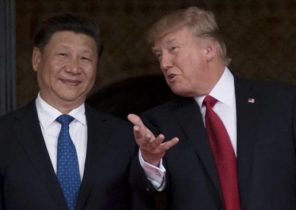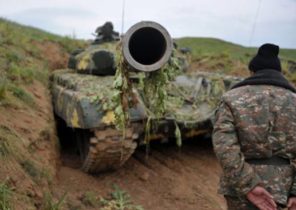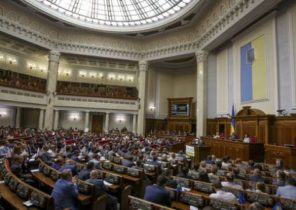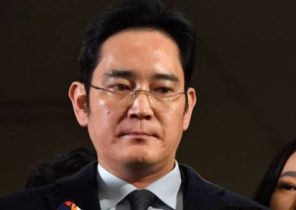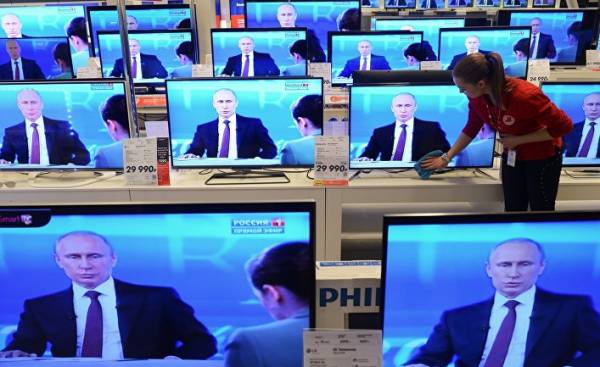
Recently in Georgia, published the results of a public opinion poll carried out by American National-democratic Institute (NDI). On the question of whether Georgia will join the Eurasian Union or to the European Union, the answers were distributed as follows: 65% want the European Union; 21% — the Eurasian Union, 7% — against both unions. A question was asked about Pro-Russian and anti-Western propaganda, which has increased markedly in recent years: 47 percent agree that Georgia is Russian propaganda, 27 per cent disagreed, and 26 percent don’t know. 39% of respondents believe that Russian propaganda is disseminated through Georgian-language channels, and 34% through political parties; 32% — through the Internet and social networks; 15% believe that through non-Georgian-language TV channels.
What is the situation in the country and what technologies are used to spread Pro-Russian and anti-Western propaganda? We discussed in an interview with Tamar Kintsurashvili, Executive Director of the Media development Fund (MDF).
The “Georgia online”: Your Fund has prepared the results of the study “anti-Western propaganda in Georgia: report of the media monitoring” for the year 2016. What picture got?
Tamar Kintsurashvili: our First study on “Analysis of media content”, we conducted in 2014-2015, although there were other studies on the evaluation of the government strategy for European integration of communication, where also was shown the results of the interim monitoring. Basically, the focus was on the conflicting messages from the authorities, which flowed smoothly in 2016, which remains a problem today. However, after the 2016 election, the number of such messages has declined, as some actors, eg.Gogi, Topadze, Tamaz Mechiauri are not in the coalition. Recently relatively decreased such messages from members of the party “Georgian dream”, may follow our research and more image-conscious, though, although the same Deputy from the majority, Nukri Kantaria been his homophobic statements, connecting with the West a different image of the sexual life, experiencing it as a problem.
It should be noted that before the parliamentary elections of 2016, between the parties “Industrialists” Gogi Topadze and “Georgian dream” Ivanishvili had differences on foreign policy, with the result that the Industrialists came from the ruling party. Despite the political divorce, the composition of the parliamentary majority for them was artificially created separate faction “Industrialists will save Georgia”. In this faction are members of the ruling party of “Georgian dream”. With some manipulation, these two political actors were together in the Pro-government majority.
— What are the views prevalent among the population?
— We do not conduct the poll, so I can’t say anything. In all societies encountered homophobic sentiment, but the problem arises when representatives of the ruling political team voiced the same messages that sow hatred among the population and transformirovalsya in motivated crime. In our society, lift excess cases occur frequently, so the ruling party and government officials bear more responsibility towards society. Do not forget that the amendments to the Constitution regarding definitions of “family” is initiated from the ruling party, while on any studies that are not the primary problem for Georgia and reinforces homophobic and anti-Western narrative.
— What political parties, non-governmental organizations (NGOs), or movement carried out anti-Western propaganda?
— In our study mainly included Georgian resources. We monitored the Georgian media, because the majority of the population looks, listens, and reads them in the Georgian language. We believe that those ethno-national media, which covertly declare their Pro-Russian stance, more dangerous than the Russian, which is less of legitimation in society and who spread their message, referring to the alleged English-language media. Here running deflection model, which consciously tolerated the attention from the original source.
We have divided politicians into two groups: 1. Open programlista who do not hide their Pro-Russian orientation, declaring that the salvation of Georgia only in the rapprochement with Russia, etc. 2. Anti-liberal ethno-nationalists. Based on comprehensive analysis, we are convinced that they are absolutely identical messages, only positioned differently. To present in ethnic and nationalist, Patriotic wrapper is much advantageous than openly declare that they support Russia. The results of the last elections showed that the party Irma Inashvili “Alliance of patriots” turned out to be much successful and got more votes than the party of Nino Burjanadze “Democratic movement — United Georgia”. Our goal is to show the public that the party in his letters do not differ from each other.
— Specify — is there a difference between anti-Western and anti-liberal rhetoric?
— You can put an equal sign, only the presentation is different. Burjanadze says plainly that we do not need NATO, i.e. an Alliance will bring danger, we do not accept, in vain we try to join, it is better to choose another way — with Russia or bezplatny status. Tarkhan-Mouravi (party I. Inashvili “Alliance of patriots”, approx.ed.) skeptical of European integration and different says: you know, among our supporters as there are opponents of NATO membership, and supporters. Why do we destroy each other over something that is unreal?— Different pozycjonowanie at first glance, it is hardly possible to put an equal sign, but the goals are identical.
Indicators of 2016, we ranked the ruling party “Georgian dream” to hybrid integration, although based on our data, we can say that in 2017 there have been changes — anti-Western statements became less, but a constitutional initiative on the part of the ruling party, regarding modification to definition of marriage, reinforce homophobic sentiments and contain anti-Western context.
As for non-governmental organizations, here we have a rather fragmented picture, although some differ in their activity in this direction, eg. “Institute of the Eurasian Union” or “Association of human rights”, which openly declare their Pro-Russian position.
— They are funded by Russia?
They have opaque funding, so we do not know where and by whom are funded and their web sites are specified, although the “Institute of information freedom development” conducted a major study, which shows their connection with the Gorchakov Fund and other Russian organizations. You can transfer and other Pro-Kremlin Georgian media: “Geworld.ge.(Georgia and the world)”, “Sakinform”, “Politicano”. Anti-liberal and ethno-national mass media: newspaper “Asaval-Dasavali”, TV-channel “Lens”, media-holding “alia”, which publishes the newspaper “alia”, “Kviris Khronika (Chronicle of the week)”, etc, Our study also showed that some openly Pro-Kremlin publisher was funded from the state budget of Georgia, for example, “Tbilisi 24”, they were issued a contract with the Ministry of execution of punishment and probation. The contract, incidentally, applies today.
— As far as I remember, “Tbilisi 24” due to Bedukadze…
— Yes, about him, however, direct ownership can not be detected, but, based on information from those who work there, see the link with Bedukadze, although the present management denies this. Formally, it does not appear the owner, but this does not mean that it is not connected.
There are concerns that Georgia’s strive to join NATO may lead to the loss of our occupied parts, and speculating Pro-Russian parties and organizations…
Such beliefs spread deliberately, and to some extent aimed at emotional perception, with the subsequent manipulation of public opinion. Indicators of 2016, the scepticism towards the Alliance was considerable, one reason was precisely the fear of a loss of our occupied territories, Abkhazia and Tskhinvali region /South Ossetia/. We know that there is precedent for a divided Germany, the Western part of which became a member of NATO, that did not prevent the restoration of the territorial integrity of this country. In our case, the international community does not recognize the independence of Abkhazia and Tskhinvali region, only Russia and one or two of her partner.
— What is the position of the Georgian Orthodox Church?
In our study the figure as a separate spiritual entity who adhere to the pronounced anti-Western views, although this is not an indication of the position of the entire Patriarchy. In parallel, made statements that support European integration, so here we have the opposite statement, I mean the declared statements. They are all officially active priests, the only Basili, Mkalavishvili officially the GOC does not represent, as it were excommunicated.
In parallel, your main resource is “Media development Fund (MDF) successfully operates other your draft Detector “myths”, where many examples of reasoned refutation of misinformation. Which countries are spreading more misinformation about our country?
The fact that some Georgian media directly identifitseerida with Russian primary sources, eg. Valerie Kvaratskhelia in his show on TV “Lens” shows some of the programs of Russian TV channels. We check other sources, as shown the video true or is it false information. Basically, the Russian media repeat the fake news, photos manipulation, such as, for example, the rape of the mummy American. In reality it turned out that information was taken from satirical-humorous publications like our “Citi news” (Georgian satirical website, approx.ed.) and distributed as real news.
With the aid of the method of deflectio such shocking facts are intentionally enter society astray, and give more legitimacy to their message. If, for example, we have published the tabloid newspaper “Asaval-Dasavali” write, besides to make it more convincing next to the text will publish a photo and show you what the news site “Pravda.ru” or “Journalistic truth”, of course, will hardly believe Russian resources. Or another example of misinformation that in England the cut off man only to sew clothes with human skin. In reality, a French designer who works in the company “Human Leather”, he decided to create clothes that the texture would be close to human skin.
Perhaps such a conception is not to everyone’s taste, but it has nothing to do with the killing of a person only to the British wearing human skin. How is the legitimacy of this news? If the information I have, a priori, no one would believe, therefore, invented fake web site in English humanleather.co.uk. If you carefully check you will find that it is a buffer site created to justify the source of information, repeatedly received the report. For more convincing, such resources was in America.
Except deflection model, what other methods are used to spread anti-Western propaganda?
For example, stories written in the satirical-humorous vein, which is presented to readers as real. In such cases, to a certain extent, used the method of demonization: take the Soviet myths, for example, the fictional, the so-called DULLES plan, not the plan of the CIA, which is directly copied from the artwork and aimed at demoralizing the post-Soviet countries, the same relative of the AIDS virus, etc. mainly used manipulative headlines, photos, video fabrication.
— Are you planning to acquaint the authorities with your research?
— Our research always contain recommendations addressed not only to government agencies but also NGOs, political parties, media. The importance of media education, we have a joint program with Deutsche Welle, which contributes to the development of photo-video of verifying the information. Social media has expanded its capacity, every day we receive a huge amount of information and not necessarily to contribute to the spread of misinformation, it is necessary to have some knowledge for operational audit. Modern technology has improved the situation from the point of view of pluralism, but there were side effects, that use such totalitarian countries like Russia and those forces that serve Russian propaganda. On the other hand, in countries with a non-traditional threat to democracy all sorts of restrictions, which can be spread not only on the propaganda platform, but also lead to a complete ban on critical thinking.
This is a serious problem not only for Georgia, but as we have seen, has become a headache for the international community, as Russian propaganda is much more organized and efficient. In Georgia, are working in this direction, not only we, but also other organizations. In this situation, the main actor is the government, which is late, but still, under the influence and activities of civil society, advocacy, first at the level of the main political document that recognized the Russian propaganda as a danger. The government should develop a sound plan of action and use all available means against misinformation. We hope that the strategy will be followed by real steps aimed at the correct and timely of our society.
— The strategic communications of the EU has released its final report, which includes your organization “media development Fund”. What this means to you?
— Many countries, including and we are cooperating with the EU Stratcome. The group consists of more than 300 experts from different countries and constantly exchange information. It is important for us to be aware of events, to understand the facts and not confuse them with fakes; to observe what trends are dominant, i.e. not to keep up with developments in the media space. Important for us is the fact that we were in the EU report, it shows that our studies and analysis of the situation in Georgia, are of interest and is recognized as a reliable source. We work with strategic communications and a permanent exchange of information.
